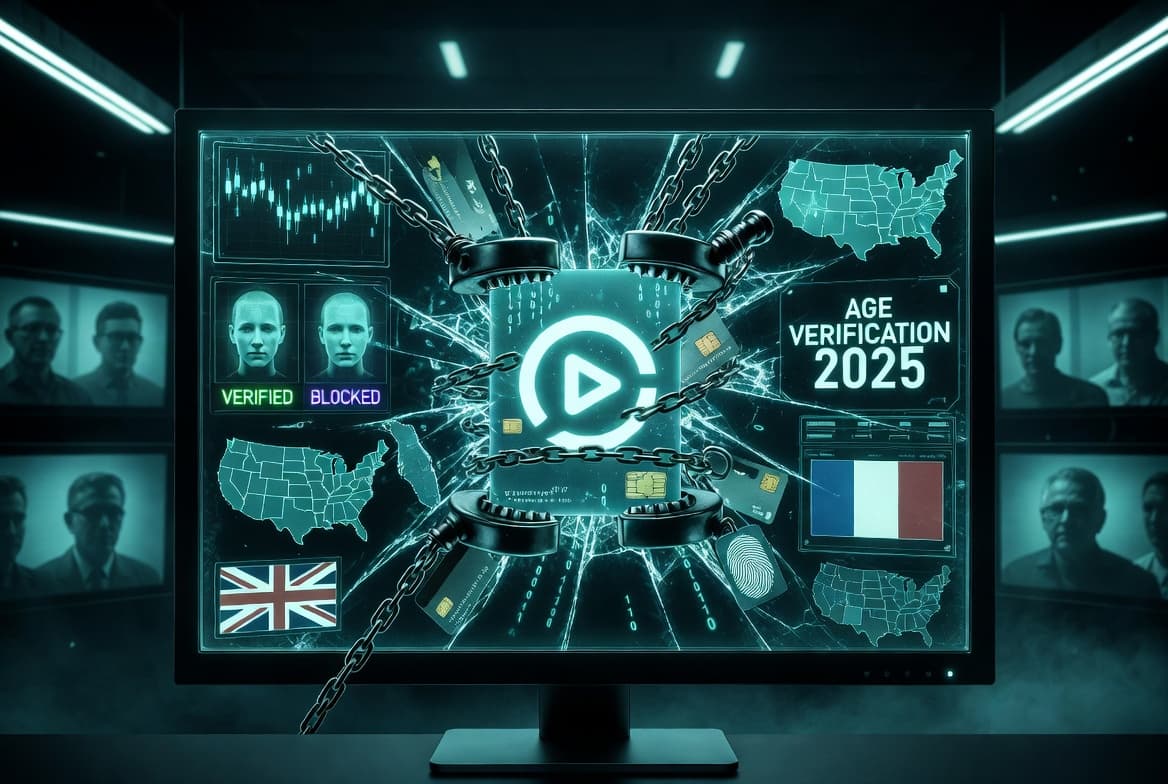Navigating the New Landscape: Adult Age Verification Laws in 2025 Reshaping the Adult Industry

by Erika S

A wave of new legislation mandating age verification for accessing adult content has firmly taken root by 2025, with more stringent measures slated to roll out throughout the year. This evolving legal landscape is forcing significant operational changes and sparking intense debate across the adult industry, technology providers, and civil liberties advocates.
The year 2025 marks a pivotal moment for the adult entertainment industry as numerous U.S. states and international jurisdictions enforce laws aimed at preventing minors from accessing sexually explicit material online. These regulations, varying in scope and technical requirements, are compelling platforms to implement robust age verification systems, moving far beyond previous self-attestation checkboxes.
The U.S. State-Level Patchwork: Laws in Effect and on the Horizon
A significant number of U.S. states have already implemented age verification laws for websites with substantial adult content. As of early 2025, states like Florida, South Carolina, and Tennessee have joined others such as Louisiana, Utah, Virginia, Texas, Montana, and North Carolina in requiring "reasonable age verification methods." These methods often involve checking against commercially available databases or verifying government-issued identification.
Several more states have laws with effective dates in 2025:
- Georgia's SB 351 is set to take effect on July 1, 2025, also including provisions for social media companies to verify age and obtain parental consent for users under 16.
- Wyoming's HB 43, also effective July 1, 2025, mandates "reasonable age verification" for websites with at least one-third pornographic content and notably includes a private right of action.
- Other states like Idaho, Kansas, Kentucky, Nebraska, Indiana, Alabama, and Oklahoma saw their laws come into force in the latter half of 2024, setting the stage for broader enforcement and compliance challenges in 2025.
The common thread among these state laws is the requirement for sites where adult content constitutes a significant portion (often defined as one-third or 25% of webpages) to verify the age of their users. Some states, like Florida, also mandate that at least one option for anonymized age verification be provided. Texas's HB 1181, which requires digital service providers to implement age verification for "harmful" or "obscene" content, remains a key piece of legislation, despite parts of it being challenged in court. The U.S. Supreme Court has even heard arguments related to the Texas law, signaling the national significance of these state-level initiatives.
Penalties for non-compliance are steep, ranging from significant daily fines to substantial penalties for each instance a minor accesses prohibited material.
International Pressure: France and UK Lead Stricter Controls
The push for age verification is not confined to the United States.
In France, the Audiovisual and Digital Communication Regulatory Authority (Arcom) began enforcing a new standard for age verification systems in 2024, with full compliance, including "double anonymity" solutions, mandated by April 11, 2025. This "double anonymity" principle aims to ensure that neither the adult website nor the age verification provider can link a user's identity to the specific content they are accessing.
The United Kingdom is also set for a major shift. Under its Online Safety Act, all websites hosting pornographic content, including user-to-user platforms and search services, must implement "highly effective" age assurance measures by July 2025. Ofcom, the UK's communications regulator, is tasked with enforcing these rules, which could include requiring photo ID or credit card checks.
The European Union's Digital Services Act (DSA), fully applicable since February 2024, also imposes obligations on platforms, especially very large online platforms (VLOPs) and search engines (VLOSEs), to prevent minors from accessing pornographic content, including through age verification tools.
Industry Adaptation and Technological Solutions
The adult industry is grappling with these new requirements. Some platforms have chosen to block access from states with stringent laws, citing difficulties in compliance or concerns over user privacy. Others are actively implementing or exploring a range of age verification technologies, including:
- Government-issued ID scanning: Users upload a scan of their driver's license or other official ID.
- Facial age estimation: AI-powered technology estimates a user's age based on facial features.
- Credit card or payment verification: Assuming that credit card holders are typically adults.
- Third-party verification services: Specialized companies offer age verification solutions, sometimes incorporating "double-blind" or anonymized methods.
- Digital ID wallets: Emerging solutions that allow users to share only age confirmation without revealing other personal details.
The demand for these technologies has spurred innovation, with a focus on balancing robust verification with user privacy and experience.
Contentious Terrain: Legal Challenges and Ongoing Debates
These age verification laws are not without controversy. Legal challenges are ongoing in several jurisdictions, primarily centered on:
- First Amendment rights: Opponents argue that these laws infringe on adults' rights to access legal speech and expression.
- Privacy concerns: The collection and storage of sensitive personal data required for age verification raise significant privacy risks, including potential data breaches and surveillance.
- Effectiveness and circumvention: Critics question whether these laws effectively prevent minors from accessing adult content, pointing to the ease with which users can employ VPNs or access non-compliant sites. Some studies suggest that while traffic to compliant sites may decrease, users might migrate to less regulated platforms.
Advocacy groups emphasize the importance of protecting children but also highlight the potential for these laws to create a chilling effect on free speech and lead to the over-collection of personal data. The concept of "age assurance" rather than just "age verification" is gaining traction, suggesting a multi-faceted approach that includes media literacy and parental controls alongside technological barriers.
The Path Forward
As 2025 progresses, the landscape of adult age verification will continue to evolve. More states are anticipated to enact similar legislation, and legal battles will further shape the interpretation and enforcement of these laws. The adult industry, technology providers, and regulators will need to navigate this complex environment, seeking solutions that address child safety concerns while upholding fundamental rights to privacy and freedom of expression. The push for international standards and interoperable age assurance systems may also gain momentum as the internet's borderless nature clashes with jurisdiction-specific regulations. For adult content providers and consumers alike, 2025 represents a year of significant adjustment and heightened scrutiny.

About Erika S
Digital culture specialist focusing on the intersection of technology and society. Erika analyzes how digital platforms are reshaping entertainment experiences and social connections.

